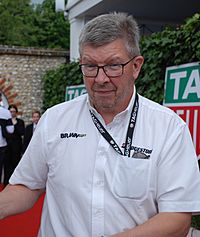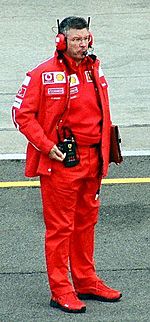Ross Brawn facts for kids
Quick facts for kids
Ross Brawn
|
|
|---|---|

Brawn at the 2016 Goodwood Festival of Speed in the clothes of his own team Brawn GP
|
|
| Born |
Ross James Brawn
23 November 1954 Ashton-under-Lyne, Lancashire, England
|
| Occupation | Formula One managing director, motor sports and technical director (2017–2022) Formula One team technical director/team principal (1991–2006, 2008–2013) |
| Employer | Formula One Group |
| Spouse(s) | Jean Brawn |
Ross James Brawn (born 23 November 1954) is a British expert in Formula One racing. He has been a managing director, motor sports director, and technical director. He used to be an engineer and team boss for Formula One teams.
Teams where Ross Brawn played a key role have won eight championships for constructors (the teams) and eight championships for drivers. He became famous as the "mastermind" behind Michael Schumacher's seven world titles. This was when Brawn was the technical director for the championship-winning Benetton and Ferrari teams.
After taking a break in 2007, he came back to F1 in 2008 as the team boss for Honda. In 2009, Brawn bought the Honda team and renamed it Brawn GP. This new team amazingly won both the Constructors' and Drivers' Championships that very year!
Later, Mercedes bought into the team. Brawn stayed on as team boss and co-owner. He eventually sold his remaining shares to Mercedes-Benz in 2011. In 2013, Brawn announced he would step down from his role. He officially retired from Formula One in February 2014.
Early Life and How He Started
Ross Brawn was born in Ashton-under-Lyne, England. From a young age, he was very interested in engineering. He often visited Belle Vue Stadium to watch different types of motor racing.
When he was 11, his family moved closer to Reading. He went to Reading School there. In 1971, he started an apprenticeship with the United Kingdom Atomic Energy Authority. This is where he learned to be an instrument mechanic. He also studied Mechanical Engineering.
While living in Reading, he saw an advertisement for Frank Williams Grand Prix. They were looking for a milling machinist, a skill Brawn had learned. He was interviewed and joined the team, which was his first step into Formula One.
Ross Brawn lives in Stoke Row, near Henley-on-Thames. He enjoys gardening, fishing, and listening to music in his free time. He is married to Jean.
Ross Brawn's Career in Motorsport
Ross Brawn's journey in motorsport began in 1976. He joined March Engineering as a machine operator. Soon after, he became a mechanic for their Formula 3 racing team.
In 1978, Frank Williams hired Brawn for the new Williams team. He quickly moved up, working in the research and development (R&D) department. He also worked as an aerodynamicist, studying how air moves around the cars in the team's wind tunnel.
Designing Cars for Different Teams
Brawn joined the Haas Lola team in 1985. He was part of the design team that created the Lola THL1 and THL2 cars. These cars were known for being great to drive, even though they didn't win many races.
When Haas Lola left F1 in 1986, Brawn moved to Arrows. There, he designed the Arrows A10 and Arrows A11 cars for the 1987, 1988, and 1989 seasons.
Later in 1989, Brawn moved to Jaguar's sports car racing division. He was the main designer for the Jaguar XJR-14. This car won the World Sportscar Championship in 1991.
Success with Benetton (1991–1996)
In 1991, Ross Brawn returned to Formula One. He became the technical director for the Benetton team. He played a huge part in their success.
Benetton won the World Drivers' Championships in 1994 and 1995 with Michael Schumacher. They also won the World Constructors' Championship in 1995. Brawn was praised for his clever race strategies.
The Ferrari "Dream Team" (1997–2006)
After Michael Schumacher's first year with Ferrari, Brawn followed him there in late 1996. As Ferrari's technical director, he was known for his brilliant race strategies.
Ferrari started challenging for championships from 1997. Brawn helped them win the Constructors' Championship in 1999. This was the first of six championships in a row for Ferrari.
With Brawn's guidance, Michael Schumacher also won five drivers' titles in a row, from 2000 to 2004. Many people called Brawn a vital part of the Ferrari "dream team." This team included Schumacher, team boss Jean Todt, and chief designer Rory Byrne.
Brawn left Ferrari on 26 October 2006. He took a one-year break from Formula One.
Leading Honda (2008)
In November 2007, it was announced that Ross Brawn would become the new team principal for Honda. He started working with the team on 26 November 2007.
Honda decided to leave Formula One in late 2008. This meant Brawn was out of the sport unless a buyer could be found. Brawn believed the team had a "race-winning car" ready for 2009.
The Amazing Brawn GP (2009)
On 5 March 2009, Ross Brawn bought the Honda team. He took control with a 54% share. The team was renamed Brawn GP and entered the 2009 Formula One World Championship.
The team kept its experienced drivers, Rubens Barrichello and Jenson Button. Brawn GP used engines from Mercedes-Benz for the 2009 season.
In their very first race in Australia, Button qualified first and Barrichello second. They finished the race in those same positions! It was an incredible start.
Jenson Button won six races in the 2009 season, and Rubens Barrichello won two. The team finished first and second in four races. Brawn GP won the 2009 Constructors' Championship. Jenson Button also won the Drivers' Championship at the Brazilian Grand Prix.
For his services to motorsport, Brawn was honored with the Officer of the Order of the British Empire (OBE) award in 2010.
Working with Mercedes (2010–2013)
In November 2009, Daimler AG (the company that owns Mercedes-Benz) bought Brawn GP. Ross Brawn, as the main owner, benefited financially from this deal. He stayed on as the team principal.
In December 2009, Michael Schumacher confirmed that a big reason he came out of retirement to drive for Mercedes GP was because of Brawn. Schumacher had worked with Brawn to win his seven world titles at Benetton and Ferrari.
The Mercedes team won their first race on 15 April 2012, when Nico Rosberg won the Chinese Grand Prix. Later that season, Michael Schumacher announced his retirement. Mercedes then announced that Lewis Hamilton would join their team for the 2013 season.
In 2013, Mercedes showed strong pace, especially in qualifying. They won three races that year: Rosberg won in Monaco and Britain, and Hamilton won in Hungary. Mercedes finished second in the constructors' championship.
On 28 November 2013, it was announced that Ross Brawn would leave the Mercedes team at the end of the year.
Retirement and New Role (2014–2022)
On 1 February 2014, Brawn announced he was retiring from Formula One.
In October 2016, Brawn hinted he was ready to return to F1, but in a strategic role rather than leading a team. His book about strategy in Formula One, called Total Competition, was released a week later.
On 23 January 2017, Ross Brawn was appointed to a new role. He became the managing director of Motor Sports and technical director for the Formula One Group. He confirmed his retirement from Formula One on 28 November 2022.
Personal Life
Helping Others
In 2010, Ross Brawn, who is a member of the RNLI (a charity that saves lives at sea), started the Brawn Lifeboat Challenge. This project aimed to raise money for a new lifeboat for the River Thames in London. They raised £360,000 in just 8 months! The new lifeboat, named Brawn Challenge, was launched in September 2012.
In 2014, he became a patron for Hope for Tomorrow. This charity provides mobile cancer care units to hospitals. These units allow cancer treatment to be given in local communities, making it easier for patients.
Books
- Brawn, Ross & Parr, Adam. Total Competition: Lessons in strategy from Formula One. Simon & Schuster (2016). ISBN: 978-1471162350
See also
 In Spanish: Ross Brawn para niños
In Spanish: Ross Brawn para niños


